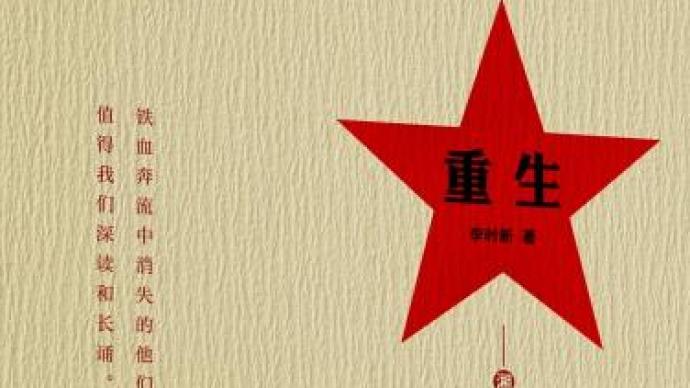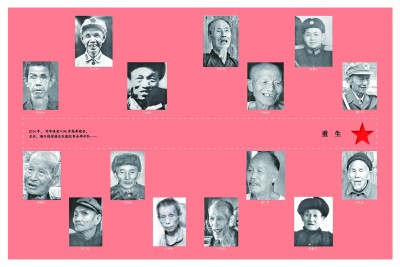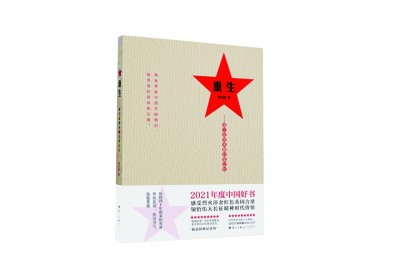

Illustration for "Rebirth - Memories of the Lost Red Army in the Battle of Xiangjiang". Photo courtesy of Lijiang Publishing House
 【Observation on Paper Publishing of Online Literature】
【Observation on Paper Publishing of Online Literature】Editor's note
Recently, the 2021 "China Good Book" was officially released. Among the 42 selected books, there are two online literature works, namely, the non-fiction literature "Rebirth - Memory of the Lost Red Army in the Xiangjiang Battle" published by Palm Reading Technology and Lijiang Publishing House, and the novel published by Lian Shang Literature and Jiangsu Phoenix Literature and Art Publishing House. "Bungee Jumping". What kind of process needs to go through the transformation of online literary works from digital form to paper publishing form? How do you view the similarities and differences between the two? How to effectively handle the relationship between the two? We invite the editors of two "China Good Books" publishers to write articles to talk about their views and feelings on these issues. At the same time, we set up the column "Observation of Paper Publishing of Online Literature", looking forward to further thinking and discussion.
Time has weight.
On the August 1st Army Day in 1979, Li Shixin, a young freshman in the Department of Chinese at Guangxi University, came from Nanning to Quanzhou County, Guilin City, 400 kilometers away. There, he met 70-year-old Chen Xinzhou, the lost Red Army in the Xiangjiang Battle who was still on duty. For more than 40 years after that, his creations were inseparable from the Red Army, Long March, Northern Guangxi, and the Lost Red Army.
In fact, in February 1978, the Cultural Bureau of the former Guangxi Guilin Administrative Office organized a survey of the Red Army's Long March across northern Guangxi. The investigation team spent more than four months along the route of the Long March, surveyed 7 counties and 136 brigades, and interviewed 77 lost Red Army soldiers who settled in Guilin and more than 550 old farmers who helped the Red Army. In 2021, 87 years after the separation of these Red Army troops and their own teams, their stories will be presented in Li Shixin's non-fiction literary work "Rebirth - Memory of the Lost Red Army in the Xiangjiang Battle" (hereinafter referred to as "Rebirth") through a combination of online literature and traditional publishing. ") among.
The Battle of Xiangjiang, which took place in the northern Guangxi region from the end of November to the beginning of December 1934, was defined by party history experts as an important historical event related to the life and death of the Chinese revolution. As the author Li Shixin wrote: "The Central Red Army, which broke out from the Central Soviet Area and has broken through the three blockades of the Kuomintang, is full of ideal devotion, facing the cold mountain wind in the early winter of 1934, stepping on blood and walking in The Xianggui Corridor, approaching the Xiangjiang River, heading for the decisive juncture of the life and death of the Chinese Communist Party and the Chinese revolution, the great turning point from setbacks to victory, and the magnificent epic that is magnificent, majestic and far-reaching."
There are twenty-two chapters in "Rebirth", each of which records a lost Red Army. From the perspective of ordinary soldiers, it describes the Red Army in their eyes, the anti-"encirclement and suppression" war, the process of the Xiangjiang Campaign, and the living conditions after the separation with the help of local villagers. Combining political height, ideological depth, artistic breadth and literary temperature, it brings many new discoveries, new cognitions and new revelations to the current readers.
Li Shixin said: "They were rescued and reborn from the brink of desperation, and their life and fate have changed dramatically. Even all the physical evidence that can prove their revolutionary career has disappeared, but the youthful imprint of faith, belief and ideal has been branded into their brains and deeply penetrated into their minds. Bone marrow, the blood of the red soldiers is always rushing in the body, mentally and spiritually, they are always striding in the ranks of the Red Army that have left them."
British historian Carlisle said that, in the final analysis, history is the real poetry, and if it is interpreted properly, the truth is far more worthwhile than the fiction.
The lost Red Army Tang Dasheng, who participated in the Jiaoshanpu blocking battle, told the battlefield story of his 15-year-old classmate Zhang Wangxiang:
In the evening, in the same trench with me, there was a young soldier with a bandage on his head and blood oozing from the bandage, reading the "Literacy Textbook for Workers and Peasants in the Central Soviet Area" aloud.
The voice of the little soldier is hoarse, but after reading the "Central Soviet Area Workers and Peasants Literacy Textbook", the words in Jiangxi Xingguo dialect are full of words: "The ninth lesson "The Length of Day and Night": Spring and autumn equinox, day and night are equally long, winter solstice day The shortest, the longest day on the summer solstice, why is it long?
The company commander, instructors and comrades surrounded him, either standing or sitting, while the wounded leaned and lay down, listening to him quietly.
Three hours later, he was shot in the head and died tragically.
Now readers who like online literature, will they continue to read when they see this?
Can the stories of the 22 lost Red Army soldiers in the Xiangjiang Battle recorded in "Rebirth" be presented in the form of online literature? We're not sure, but willing to try. We wanted to bring to our readers some historical details that were once overlooked. We believe that Li Shixin's search for more than 40 years is valuable.
In the second half of 2020, we brought this idea to Palm Reader, our partner for many years.
We believe that online literature is also the expression of traditional literature of the times. Traditional publishing needs to learn from online literature, rather than resist and distrust. Since 2015, Lijiang Publishing House has cooperated with the team of Professor Shao Yanjun from the Department of Chinese Language and Literature of Peking University in the "Annual Selection Series" of literature to launch "Annual Chinese Internet Literature", focusing on works that have finished or serialized the main part of the annual Internet literature and have updates. On the basis of referring to the lists of major literary websites and the reputation of the fan circle, the works with high literary quality are selected for publication. The launch of "Chinese Annual Online Literature" is an attempt to guide online literature to connect the pleasure mechanism with traditional literary values.
In 2018, Lijiang Publishing House established the Integrated Development Department to carry out digital publishing value-added services, including e-book development, knowledge-paid audio project development, modern paper book transformation and upgrading and other major sectors. By actively expanding cooperation with third-party platforms, combining Digital new technology, to create a publishing integration product with the "Internet +" model with Lijiang characteristics. The Integrated Development Department has been involved in the book production process at the stage of topic selection and planning, and actively cooperated with various Internet platforms to explore new marketing models for digital publishing. The number and sales of digital products such as e-books, audio books, and premium courses have grown steadily. As of April 2022, this department has led, coordinated and assisted various departments of Lijiang Publishing House to transform and upgrade more than 300 types of "modern paper books"; more than 4,200 types of e-books (including copies) and more than 3,600 audio and video products have been launched on multiple platforms. set (with replicas). In recent years, the total network traffic of Lijiang Publishing House's digital products has exceeded 45 million, and it has been selected as the "Innovative Case of National Press and Publishing Deep Integration Development" by China Press and Publishing Media Group.
In recent years, Palm Reading Technology has vigorously promoted the creation of original online literature with realistic themes, and the two hit it off. In March 2021, Palm Reading Technology launched a rich media online version of "Rebirth" in the form of listening books, videos, scrolling pictures, interactions, and e-books. Almost at the same time, Lijiang Publishing House published a paper version of the book of the same name.
Combining data such as user preferences, work popularity, and reading time, "Rebirth" was selected as one of the ten "Annual Published Books" in the 2021 "Sailing Good Book List".
According to the theory of media transformation, every media revolution occurs, the old media is not replaced but included, and the old media becomes the "content" of the new media. Perhaps, traditional literature has arrogance and prejudice against online literature based on ideological and artistic quality; online literature has arrogance and prejudice against traditional literature because it is backed by the market. Now, such "arrogance and prejudice" should start to be put down.
"Rebirth" is not a work obtained by reading and consulting materials, but a "walking writing" based on more than 40 years of searching. What we know today about the facts and stories of the lost Red Army is not just what they said and did at a certain historical stage or on a certain day, but needs to know more than specific, trivial facts The details and truth of history, and through this real cognition, have a deeper understanding of life.
Related Posts